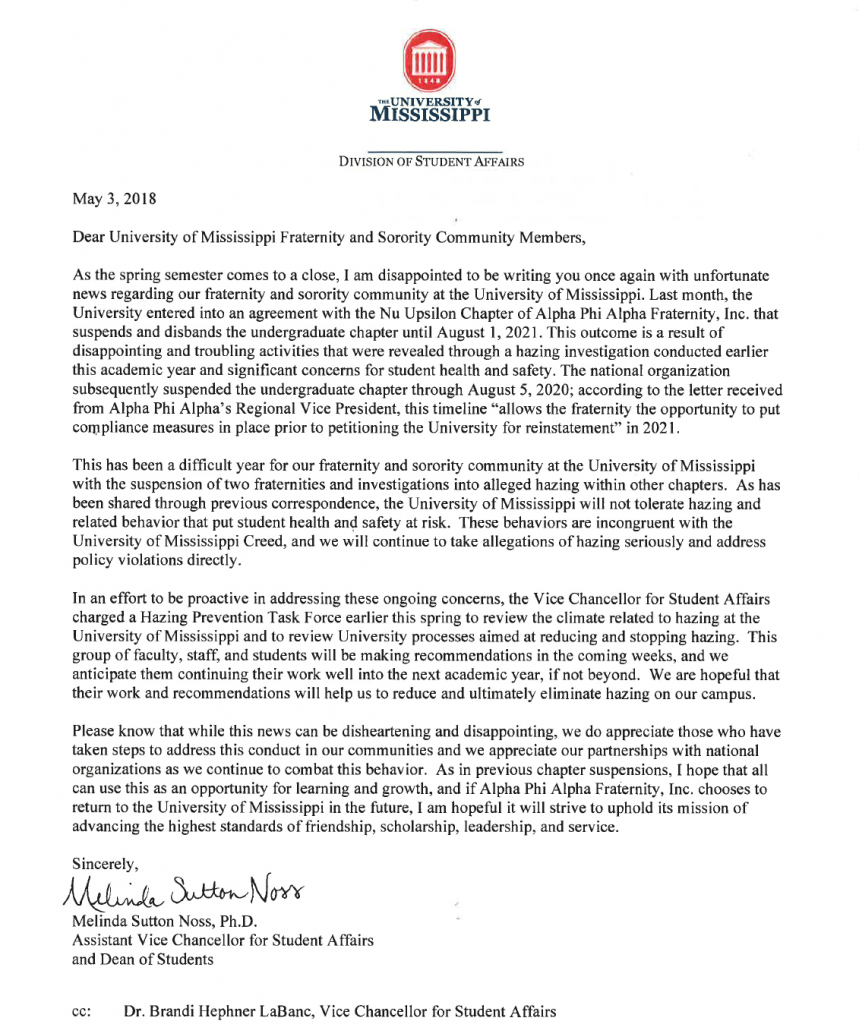The university’s chapter of Alpha Phi Alpha fraternity, a National Pan-Hellenic Council fraternity, has been disbanded until 2021 due to the findings of a hazing investigation, according to a statement released by the student affairs office Thursday morning.
“This outcome is a result of disappointing and troubling activities that were revealed through a hazing investigation conducted earlier this year and significant concerns for student health and safety,” Melinda Sutton Noss, assistant vice chancellor for student affairs and dean of students, wrote in Thursday’s letter.
Although exact details have not been released, Sutton Noss said that both the University of Mississippi and Alpha Phi Alpha fraternity’s national representatives decided that the investigation “revealed actions concerning enough that the chapter should be closed for a period of time.”
“The investigation into hazing allegations occurred earlier this academic year,” Sutton Noss wrote in an email to The Daily Mississippian. “The organization has been on an interim suspension status since that time and has not been operating.”
Alpha Phi Alpha is the second on-campus Greek organization to be suspended this year. The university’s chapter of Sigma Alpha Epsilon, an Interfraternity Council fraternity, was suspended this year as a result of findings from a similar hazing investigation.
Sutton Noss wrote in Thursday’s letter that other chapters on campus also faced hazing allegations this year, but she clarified via email that there are no active investigations related to hazing.
She said the Hazing Prevention Task Force, which was established in February 2018 by Brandi Hephner LaBanc, vice chancellor of student affairs, will make recommendations in the next few weeks based on its investigation and will likely continue its work through next year.
The task force, which is comprised of faculty, staff and students, will review the university’s policy and definition of hazing, the climate related to hazing at Ole Miss and the university processes aimed at reducing or stopping hazing, according to Sutton Noss. She said the group anticipates recommendations in those three areas.
“A variety of university offices and departments emphasize and frequently communicate long-standing anti-hazing policies with our students,” Sutton Noss said. “In addition, we take a proactive approach to educating students and parents about hazing. Ultimately, though, we must rely on our community and our organizations to hold each other accountable with respect to hazing.”
She said high-risk behaviors within the university community are often mitigated in several ways that are independent from the Hazing Prevention Task Force’s work earlier this semester.
Mandatory education regarding alcohol, drug and sexual violence prevention is required for new potential members of fraternities and sororities. The university has also updated the on-campus event registration process to curb high-risk behavior. Along with the creation of a hazing reporting form, UM also provides hazing prevention resources, both of which are available on the university’s website.







